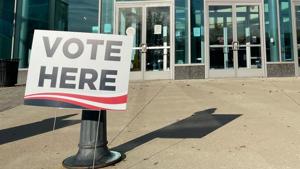(The Center Square) – Opponents of a measure on Illinois Gov. J.B. Pritzker’s desk are concerned poll watchers won’t be able to verify vote-by-mail procedures conducted in nursing homes where voters may be physically and mentally incapacitated.
During the COVID-19 pandemic, under emergency order, nursing home voters were legally able to cast ballots through vote-by-mail procedures. Now, state Rep. Maurice West, D-Rockford, wants to codify the temporary procedures in statute with House Bill 4488.
“They’re already able to vote-by-mail in nursing homes, we are just clarifying a rule that was put in place during the pandemic and putting it in statute,” said West.
In Illinois, opponents fear the proposed law will allow incapacitated voters to be coerced into turning in incomplete ballots by nefarious ballot harvesters.
State Rep. Patrick Windhorst, R-Metropolis, raised concerns that nursing home voters could cast a vote through vote-by-mail procedures. Previously, those voters only casted ballots on the premises.
“There have been some concerns that there won’t be poll watchers there if these ballots are mailed in versus the voting effort at the nursing home, and there’s some concerns about the transparency of that process. Why did we add that [nursing home voters can now vote-by-mail]?” Windhorst said on the House floor.
Proponents argue the change will expand voter rights and provide convenience to older voters. The proposed law applies to federally operated nursing homes, veterans’ homes, hospitals or facilities.
Along with codifying vote-by-mail procedures in Illinois nursing homes, the proposed law would remove all caps on transfers from political party committees to candidates during primary elections. Previously, caps were only absent in general elections.
The bill would also allow cannabis dispensaries to contribute to political parties. West said the change would comply with a 2017 court ruling.
State Rep. Dan Caulkins, R-Decatur, raised a question about why the election law language hadn’t been changed in the last seven years since the court ruling that said it’s a violation of First Amendment rights to deny cannabis dispensaries to contribute to political parties.
“So what’s happened over the last seven years? Our elections laws said that they [cannabis dispensaries] can’t contribute, but the court said they can,” Caulkins said. “I mean has it [the current law] been unenforceable?”
West confirmed the law not allowing dispensaries to contribute has just been non-enforceable since 2017.
“This is just cleaning up language … we had language in the statute before the case, so now we are taking that language out now that the case concluded in 2017,” said West.
The U.S. District Court for the Northern District of Illinois struck down an Illinois law that banned licensed medical marijuana businesses from making contributions to candidates, PACs and other political committees. Judge John Lee ruled that the ban violated businesses’ First Amendment rights. The Liberty Justice Center advocated against the ban.
Reform for Illinois executive director Alisa Kaplan told The Center Square that her organization tried to get a provision in the omnibus that dealt with deep fake electioneering.
“For example, if someone used Artificial Intelligence to create a Joe Biden video saying, ‘stay home this election to vote for me,’ the legislature could have included legislation in the omnibus that address that,” she said.
The proposed law has yet to be signed by Gov. J.B. Pritzker.





